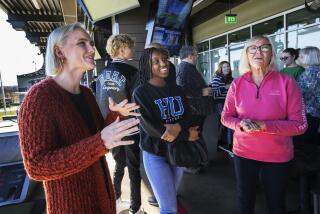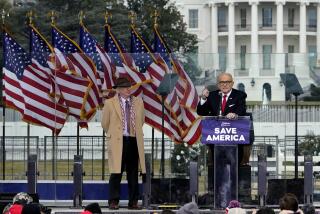Gates Knew of Aid to Contras in 1986, Ex-CIA Official Says
- Share via
WASHINGTON — Robert M. Gates, President Bush’s nominee to head the CIA, was in the “universe of people” at the agency who knew in 1986 that White House adviser Oliver L. North was providing support to the Nicaraguan resistance movement, an ex-CIA official said Thursday.
Alan D. Fiers Jr., testifying before the Senate Intelligence Committee for the first time since he pleaded guilty to charges stemming from the Iran-Contra scandal, provided some new circumstantial evidence that Gates may have been more aware of North’s illegal activities than he has acknowledged. But he did not directly contradict Gates’ claim that he played only a limited role in the affair.
Fiers, who headed the CIA’s Central American Task Force during the tumultuous years of 1984 to 1986, also told an emotional story of personal hardship suffered by him and other top agency employees as a result of the secret sale of arms to Iran and the illegal diversion of the profits to the Contras by officials of the Ronald Reagan Administration.
His testimony shed new light on then-CIA Director William J. Casey’s role in preserving the secrecy of the Iran-Contra initiative and appeared to implicate Clair E. George, Fiers’ immediate superior, who recently has been indicted in connection with the scandal.
Even though Fiers did not quarrel with most of Gates’ earlier Iran-Contra testimony, he painted an unflattering portrait of the nominee as an unyielding taskmaster who--as Casey’s deputy--decreed in 1987 that any CIA employee involved in Iran-Contra who retained a lawyer would be fired.
Although both Fiers and former CIA Deputy Director John N. McMahon testified in favor of Gates’ confirmation, Bush’s nominee was assailed by Thomas Polgar, a former CIA official who worked as an investigator for the Iran-Contra congressional investigating committees.
Polgar insisted that Gates has not been telling the truth when he says he did not play a major role in the affair or subsequent efforts by the CIA to conceal it from Congress. Polgar said his views were bolstered by evidence that he gathered in 1987 as head of the Iran-Contra committee’s investigation of CIA involvement in the affair.
“In Robert Gates, I see an official closely associated with the errors and misjudgments of the past,” Polgar declared. “ . . . Mr. Gates was part of the cover-up and concealment, including lying to Congress.”
His accusations elicited an indignant reaction from Gates’ supporters on the Intelligence Committee.
Sen. William S. Cohen (R-Me.) emphasized that, in the official findings of the Iran-Contra committees, Gates was never accused of lying, and he accused Polgar of simply trying to rob the would-be CIA director of his good name.
Polgar offered no new evidence of Gates’ role, but he insisted that the panel had been misreading the existing information. Although his testimony added drama to the proceedings, it was not expected to jeopardize Gates’ confirmation. A majority of committee members clearly support Gates.
Gates, currently the President’s deputy national security adviser, was nominated to be CIA director by Bush last May. But Fiers’ guilty plea in July reopened the issue of Gates’ involvement in Iran-Contra and caused the Intelligence Committee to delay confirmation hearings.
Four years ago, questions about Gates’ role in Iran-Contra forced him to withdraw himself from consideration as CIA director after President Reagan had nominated him to succeed Casey at the helm of the agency.
Fiers said that Casey probably knew about North’s role in arranging the illegal diversion of profits from the sale of arms to Iran to support the rebels in Nicaragua. North made the same assertion during his 1987 appearance before the congressional Iran-Contra hearings.
Fiers supported his view of Casey’s role by recalling a meeting in 1986 in which the late CIA director confronted North and asked the White House aide directly if he was involved in providing operational support for the Nicaraguan resistance. At the time, Congress had banned U.S. aid to the Contras.
North replied “no.”
After the meeting, Fiers said, he was told by George that the discussion between North and Casey was a “charade” that had been staged for their benefit. Fiers recalled being stunned and said he told George: “Jesus Christ, if that’s true, this will be worse than Watergate!”
After the Iran-Contra scandal became public knowledge, Fiers recalled, Casey gleefully chortled: “Ollie ran one hell of an operation, didn’t he?”
Fiers recalled another intense moment when Gates interrupted a meeting in which he and George were discussing the legal troubles that one of their CIA colleagues faced as a result of his involvement in North’s Contra-supply operation. They remarked that the man probably should get a lawyer or take the Fifth Amendment when called to testify before Congress.
According to Fiers, Gates shot back: “Well, if he does that, he’s fired.”
He said Gates’ response in this instance was consistent with his reputation. Gates was known throughout the agency, he said, as a gifted, capable man who was nevertheless “aloof,” “on the make” and extremely skillful at bureaucratic jockeying.
Gates’ remark indicated to Fiers that he, too, would be in trouble if he hired a lawyer, but he ultimately did so in late 1987.
The story of how Iran-Contra destroyed his career clearly moved many members of the committee, and Sen. Warren B. Rudman (R-N.H.) said it demonstrated “the human cost of an Administration taking a policy and adopting an opposite covert policy.”
Testifying under a grant of immunity from further prosecution, Fiers, once one of Casey’s confidants at the agency, said he had nine meetings with Gates that touched on aspects of Iran-Contra before it escalated into a full-scale public scandal in November, 1986.
But he emphasized that in none of these discussions did Gates demonstrate any knowledge that profits from the arms sales were being diverted to the Contras.
He said he was told by George in 1986 that he was one of “a handful” of agency officials who knew about the diversion, and he did not consider Gates to be among them.
At the same time, he knew Gates as someone who had gotten enough “glimpses, snatches and insights” into North’s program of support for the Nicaraguan rebels to know that it was probably in violation of a law prohibiting U.S. assistance to the Contras.
“I felt there was a universe of people who had some knowledge of a White House operation,” he said. “ . . . I believe that Bob Gates was in that broad universe. . . . Bob Gates understood the general framework.”
McMahon, whom Gates replaced as deputy CIA director in 1986, was even more willing than Fiers to exonerate Gates of any involvement in Iran-Contra. He said that, although the CIA participated legally in the Iran arms sales, the agency had no role in assisting the Contras and, therefore, Gates had no reason to know about it.
“This operation was not a CIA operation,” he emphasized. “All of the shots were called at the (White House). We were simply in a ‘you call, we haul’ situation.”
McMahon supported Gates’ testimony that CIA officials took care to learn as little as possible about North’s support for the Contras, primarily because Congress had strictly prohibited the agency from participating in any such initiative.
Polgar, demonstrating a strong grasp of the reams of evidence accumulated during five years of Iran-Contra investigations, said Gates’ contention that he was cut out of the “loop” at CIA on the Contra-support program was implausible.
“By early 1986,” he said, “in my opinion, it would have been impossible for any senior CIA officer, let alone the deputy director, not to know that CIA was involved in support of the Contras.”
Among the specific incidents he cited was an electronic message that North sent to his superiors on April 16, 1986, that indicated Gates was taking an active role in management of the Iranian initiative.
Polgar cited another message sent to North by John M. Poindexter, then-White House national security adviser, in July, 1986, saying that he had told Gates that the Contra-supply operation should be phased out in anticipation of the resumption of federal funding.
Fiers testified that shortly thereafter he was asked by Gates if the CIA could purchase the planes and other equipment being used by North’s Contra-supply operation. He said this was one indication he had that Gates knew generally about the initiative.
Sen. Cohen, who served on the Iran-Contra committee, accused Polgar of making “a leap of logic from the facts, which do not support the conclusion you arrived at.” He noted that former Deputy CIA Director Bobby Inman has said he was kept in the dark about some CIA operations by Casey.
But Polgar countered that Inman--unlike Gates--was at odds with Casey. “He and Casey did not make beautiful music together,” he said. “Between Casey and Gates, it was love at first sight.”
Under questioning by committee members, Fiers admitted that the CIA had gathered information suggesting that some members of Congress and congressional staff members were providing intelligence to the Sandinista government in Nicaragua. He said it specifically implicated the then-staff director of the House Foreign Affairs subcommittee on Latin American affairs.
But he strongly denied allegations that Casey sought to blackmail members of Congress by using the information, and he denied that the CIA had dossiers on any member of Congress.
Meanwhile, the committee made public a copy of a memo that Gates had sent to Casey on Dec. 14, 1984, that showed he was an early advocate of armed U.S. intervention to bring down the Sandinista government in Nicaragua.
After warning that the Contras were near collapse and could not overthrow the Sandinistas “even with American support,” Gates argued that the United States should break relations with the Nicaraguan government, support a Contra government-in-exile and use its own Air Force to stage “air strikes to destroy a considerable portion of Nicaragua’s military buildup, focusing particularly on the tanks and helicopters.”
Gates acknowledged that he was advocating “hard . . . probably politically unacceptable” measures. But he argued that the Reagan Administration’s “half-hearted” support for the Contras would leave the Sandinistas free to set up a “second Cuba” in Central America.
Saying it was time to “talk absolutely straight” about Nicaragua, Gates told Casey: “You either acknowledge that you are willing to take all necessary measures--short of military invasion--to bring down the regime, or you admit that you do not have the will to do anything about the problem . . . .”
More to Read
Get the L.A. Times Politics newsletter
Deeply reported insights into legislation, politics and policy from Sacramento, Washington and beyond. In your inbox three times per week.
You may occasionally receive promotional content from the Los Angeles Times.










